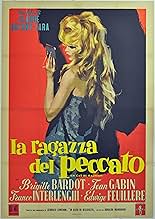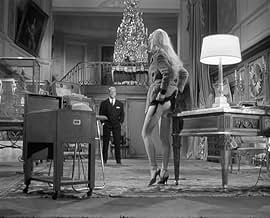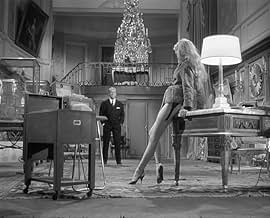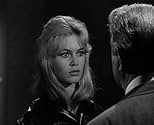En cas de malheur
- 1958
- Tous publics
- 2h 2m
IMDb RATING
6.7/10
1.7K
YOUR RATING
A straight laced lawyer starts a destructive affair with Yvette, a young shoplifter who offers herself as payment for his legal services.A straight laced lawyer starts a destructive affair with Yvette, a young shoplifter who offers herself as payment for his legal services.A straight laced lawyer starts a destructive affair with Yvette, a young shoplifter who offers herself as payment for his legal services.
- Awards
- 1 nomination total
Georges Seey
- Le bijoutier
- (as Georges Scey)
Featured reviews
Brigitte Bardot et amie invade a jeweler's shop and rob him. While they are doing so, a woman enters and complicates matters, so they knock her out. She may die. The friend is picked up, and Bardot heads to the well known defense lawyer, Jean Gabin. She has no money, so she raises her skirts. Gabin says nothing, gets her off, and then they begin an affair. Gabin is married to Edwige Feuillère. Bardot sleeps around, but says she loves Gabin, even as she has regular horizontal sessions with communist medical student Claude Magnier.
It's a last flare of Pepe Le Moko for Gabin. He's no longer the young criminal. He's older. He's solid. He's married, and Bardot is his last chance for.... if not love, then sexual obsession. Yet director Claude Autant-Lara is no poetic realist. The sexuality of his characters is not cloaked in symbols. It's Bardot walking around naked for a few seconds, it's Bardot and Magnier wearing the same sweater. To show they are linked.... and they must comment on it. There's no need for the audience to dig, it's all laid out for them, and as a result, it's less involving. The performances are great, but without the confidence of the director, there is no magic.
It's a last flare of Pepe Le Moko for Gabin. He's no longer the young criminal. He's older. He's solid. He's married, and Bardot is his last chance for.... if not love, then sexual obsession. Yet director Claude Autant-Lara is no poetic realist. The sexuality of his characters is not cloaked in symbols. It's Bardot walking around naked for a few seconds, it's Bardot and Magnier wearing the same sweater. To show they are linked.... and they must comment on it. There's no need for the audience to dig, it's all laid out for them, and as a result, it's less involving. The performances are great, but without the confidence of the director, there is no magic.
The film under review closes off nicely Claude Autant-Lara's impeccable 15-year run of noteworthy pictures that had begun with 1943's DOUCE (see my upcoming rave review); it is also notable for being an unlikely but fairly successful meeting between the biggest (Jean Gabin) and hottest (Brigitte Bardot) stars in French Cinema at the time i.e. just before the outbreak of the "Nouvelle Vague" brought along a horde of fresh and irreverent talent. Adapted from a Georges Simenon novel, the plot of EN CAS DE MALHEUR is quite predictable and not entirely convincing but the consummate professionalism of all concerned smooths over any bumps that come up along the way. Bardot is an aimless youth who, together with her reluctant girlfriend, amateurishly attempts to pull off a small-time jewel heist that, inevitably, goes wrong and, eventually, picks up Gabin's name at random from a phone book to act as her defense counsel in court; not having the financial means to pay for his services, she elects to remunerate him in the only way she knows how: seduction. Although this particular sequence, as shown in the finished film, is disappointingly chaste, the deleted clip reproduced at the end of the copy I acquired is, however, too crude to be seen at such an early stage of the film and, in my opinion, the director was wise to jettison it; in any case, he did contrive to gives us a good look at the gloriously naked body (solely from the back, of course) of the 23-year old Bardot later on when she rushes out of the bathroom and into bed (much to the chagrin of Gabin's mousy secretary) of the apartment that Gabin provided her with! Needless to say, Gabin is already married (to the formidable Edwige Feuilliere) and, although on the surface she appears to condone Gabin's latest flirtation, she is obviously none too happy about it. To complicate matters further, Bardot is also seeing her irascible Italian lover (Franco Interlenghi) on the side and things come to a tragic head when she unwisely decides that loveless wealth is preferable to blissful poverty. Abetted by Jacques Natteau's noir-ish lighting and Rene' Cloerec's fine score, the colorful cast also includes three alumni from the films of Luis Bunuel, namely Julien Bertheau (appearing briefly at the very end as the investigating inspector at the scene of the crime passionel), Jean-Pierre Cassel (unbilled as an animated trumpeter, one of Bardot's casual lovers) and an unrecognizable Bernard Musson – and even Jacques Marin and Daniela Bianchi (also unrecognizable). While the film's 122-minute running time would seem overgenerous on paper, it is only the belated (and unnecessary) introduction of the character of Bardot's maid that makes one realize this as we lay watching; I strongly suspect that the film-makers wanted to push the boundaries of censorship even further by hinting at a possible ménage-a-trois between her, Bardot and Gabin but, perhaps thankfully, this is not made all that clear in the few scenes they share together
which is just as well since the huge difference in age between on screen lovers Gabin and Bardot and the above-mentioned nude scene had already raised the proverbial conservative eyebrows! For the record, the film was remade 40 years later as EN PLEIN COEUR aka IN ALL INNOCENCE with Virginie Ledoyen stepping into Bardot's 'shoes'.
The two hours of this film fly by as your mind is transposed into the heads of both Yvette AND André. Director Autant-Lara's skill is that he allows you to live this story through both of his protagonists' eyes.
Almost instantly you are whisked off to 1959 in this time machine. When you're there you feel uncomfortable, the mood is tense but there's still some humour to keep you going. Unlike some films which give you a flavour of the time they were made in, this one doesn't just give you a sense of 1959, it makes your mind think like it would have in 1959. You are there, you are living in Paris at the end of the 50s, you always have and your attitudes are like neighbours.
André, played infused stoic passion played brilliantly by M. Gabin, like any man with breath in him, cannot of course resist the naive seductive allure of Mlle. Bardot. He behaves utterly stupidly but maybe because it's Brigitte Bardot who's making him do this you don't just understand but can see yourself doing this same thing as well. You find yourself living his life. It must be that empathy engendered by the cleverness of this film which makes you personally feel scared of the consequences of your actions.....even though they're the actions of a dead actor playing a fictitious role written by the guy who wrote Maigret.
Films which drag you into the story are few and far between so treasure this one.
Almost instantly you are whisked off to 1959 in this time machine. When you're there you feel uncomfortable, the mood is tense but there's still some humour to keep you going. Unlike some films which give you a flavour of the time they were made in, this one doesn't just give you a sense of 1959, it makes your mind think like it would have in 1959. You are there, you are living in Paris at the end of the 50s, you always have and your attitudes are like neighbours.
André, played infused stoic passion played brilliantly by M. Gabin, like any man with breath in him, cannot of course resist the naive seductive allure of Mlle. Bardot. He behaves utterly stupidly but maybe because it's Brigitte Bardot who's making him do this you don't just understand but can see yourself doing this same thing as well. You find yourself living his life. It must be that empathy engendered by the cleverness of this film which makes you personally feel scared of the consequences of your actions.....even though they're the actions of a dead actor playing a fictitious role written by the guy who wrote Maigret.
Films which drag you into the story are few and far between so treasure this one.
I have no doubt that every cinephile has his or her own favourite adaptation of the prolific Belgian novelist Georges Simenon. This is certainly one of mine. It is directed by Claude Autant-Lara whose last great film this was before his downward curve. Jean Gabin had long since ceased to play the underdog pursued by implacable fate and here gives a faultless performance as a well-heeled, world-weary and somewhat shady lawyer. Brigitte Bardot, in probably her best role, is the tantalising coquette with whom he becomes infatuated. Bardot herself was dismissive of most films in her career, understandably so, although I would be very surprised if this were one of them. The film is beautifully shot by Jacques Nattau with an excellent score by the director's favoured composer Rene Cloerec. Mention must be made of the divine Edwige Feuiliere, one of the greatest actresses of her generation. In one of her best film roles of the 1950's she is tremendous as the wife who turns a blind eye to her husband's peccadilloes. Her character's attitude typifies the thin dividing line between complacency and complicity. As one would expect from this director this is a well-crafted and deeply cynical piece about the frailties of human nature and is one of those films that really gets under the skin.
This one was a tough watch. I've always liked Jean Gabin. He always reminds me of Spencer Tracy, just a great, solid, likeable leading man. Bardot, on the other hand, I never much cared for. Sure she's great looking, but as an actress she somehow never really convinced me. She's in the opening scenes of En Cas de Malheur, and she immediately rubbed me the wrong way and the movie never really recovered. I could'nt get passed her as an actress to get to the character she was portraying. Gabin was solid as always, I liked the music and the lady who played his long-suffering wife. The two hour running time is a bit too generous for the interesting but often told tale the movie is offering us. I hoped for more.
Did you know
- TriviaDaniela Bianchi's debut.
- Quotes
Maître André Gobillot: It was hard. I had to make it simple. That's the hard part. See?
- ConnectionsEdited into Histoire(s) du cinéma: Seul le cinéma (1994)
- How long is Love Is My Profession?Powered by Alexa
Details
- Release date
- Countries of origin
- Language
- Also known as
- Love Is My Profession
- Filming locations
- Production companies
- See more company credits at IMDbPro
Box office
- Budget
- $750,000 (estimated)
- Gross worldwide
- $49,454
- Runtime2 hours 2 minutes
- Color
- Aspect ratio
- 1.66 : 1
Contribute to this page
Suggest an edit or add missing content





























